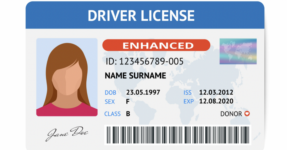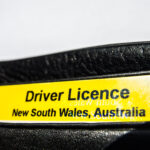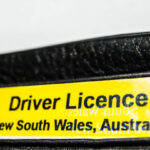Can I Drive in New South Wales on an Overseas Driver Licence?

Visitors from abroad can drive in New South Wales with an overseas licence, but there are special conditions to be aware of, and an overseas licence is only valid for a specific period of time.
The general rule across the board is that all drivers must only drive the type or class of vehicle that they are licensed to drive in their home country. For instance, if you’re only licensed for a motorbike in your home country and not a car, you cannot drive a car in Australia.
In addition, new rules which recently came into effect will close a loophole that has allowed temporary visa holders to drive a car or ride a motorcycle in New South Wales on a foreign licence without being prohibited from driving as a result of accumulating demerit points for traffic offences.
Study and work visa holders
From 1 July 2023, those who hold temporary visas – such as to study or work in Australia – will be required to obtain a New South Wales driver licence if they have continuously resided in the state for six months and wish to continue driving. The same rule will apply to rider licences.
Visitors
The rules in relation to visitors to Australia – such as tourists – are that they can drive or ride in New South Wales using an overseas licence for up the three months provided they:
- Remain a temporary overseas visitor;
- Have a current overseas driver licence;
- Have not been disqualified from driving in New South Wales or anywhere else in Australia or overseas; and
- Have not had a licence suspended or cancelled, or visiting driving privileges withdrawn.
- The overseas driver or rider licence must be in an English translation if it is in a foreign language or, alternatively, an International Driving Permit. Drivers and riders must carry this with them at all times.
International visitors are encouraged to download the Road User Handbook before getting behind the wheel.
Interstate travellers and New Zealanders
Australians from other states and territories and New Zealanders (who have special status and generally do not need a visa to live and work in Australia long term) can drive for a period of up to three months on a valid interstate or a New Zealand driver licence.
Heavy vehicles
Those from out of state or New Zealand and hold a licence to drive a light rigid (LR), medium rigid (MR), heavy rigid (HR), heavy combination (HC) or multi-combination (MC) licence, are exempt from obtaining a New South Wales driver licence for a total period of 12 months from the date of arrival.
However, this 12-month period is currently under review and you’re advised to check with Transport for NSW for the latest information.
Rules for obtaining a New South Wales driver or rider licence
The rules that apply to obtaining a New South Wales driver or rider licence depend on the country in which the applicant holds their existing foreign licence.
Those who hold a licence issued in any of the following countries are not required to undertake a knowledge test or a driving or riding skills test before they can be issued with a New South Wales licence.
| Austria | Japan |
| Belgium | Jersey |
| Bosnia and Herzegovina | Luxembourg |
| Canada | Malta (for licences first issued after 2 January 2004) |
| Croatia | Netherlands |
| Denmark | New Zealand |
| Finland | Norway |
| France | Portugal |
| Germany | Singapore |
| Greece | Spain |
| Guernsey | Sweden |
| Ireland | Switzerland |
| Isle of Man (for licences first issued after 1 April 1991) | United Kingdom |
| Italy | United States of America |
Those who hold a licence issued in any of the following countries and are at least 25 years of age are similarly not required to undertake a knowledge test or a driving or riding skills test.
| Bulgaria | Republic of Cyprus |
| Czech Republic | Republic of Korea (South Korea) |
| Estonia | Republic of Serbia |
| Hong Kong (must have held the licence for at least 12 months) | Romania |
| Hungary | Slovakia |
| Latvia | Slovenia |
| Lithuania | South Africa |
| Poland | Taiwan |
Those who do not hold a licence in any of the above countries, or who hold a licence in the second group and are under the age of 25 years, will need to pass a knowledge test and a skills test before they can be issued with a New South Wales licence.
Driving offences in New South Wales
It is important for international licence holders to be aware that using a mobile phone is strictly prohibited while driving, and driving after consuming alcohol and drugs are considered to be serious offences.
The NSW demerit point scheme
Under new laws, temporary visa holders on a foreign licence will lose driving privileges if they accrue 13 or more demerit points, which can accrue for offences of speeding, failing to stop at a red light (or a yellow light when it was safe to stop before it), illegal turns and so on.
The ‘demerit point’ scheme is the main penalty scheme for minor traffic offences in Australia.
These types of offences normally also come with fines.
Unrestricted driver licence holders (unrestricted means those drivers who are not on learner or provisional licences) can only accrue less than 13 demerit points over a period of three years.
Different traffic offences have different demerit points. If you accrue 13 points, your licence is automatically suspended.
You can find out more about the demerit scheme, and when double-demerit points are in force across New South Wales here.
If you lose driving privileges, you will then have to apply for a NSW driver licence to be legally in charge of a vehicle on a road.
Overseas road users are expected to know the road rules. Fines and the accrual of demerit points are not the only penalties. For very serious offences if a person, animal or property is damaged, criminal charges may be laid.
Serious driving offences which cause harm or death
Even though in Australia, driving licenses and road and traffic rules are regulated and managed by each State or Territory, they are similar across the nation. Further, in 1999, the Australian Road Rules Agreement came into force. What this agreement means is that no matter where you commit an offence, police officers or the department of roads will contact authorities in your home state and inform them of your infringement. So, if for example, you hold a Western Australian driver or rider license, but you’re caught speeding in New South Wales or committing another traffic offence, penalties will still apply.
Australia’s vast open spaces mean that driving is often the best option for visitors who really want to explore the countryside. However, visitors and visa holders are strongly encouraged to know the rules. Not knowing the road rules is not an adequate defence in court.
In 2015, an American visitor, who held an international driving permit pleaded guilty to two counts of dangerous driving causing death, three counts of dangerous driving causing grievous bodily harm and one count of dangerous driving causing bodily harm after driving on the wrong side of the road causing a crash which killed his wife. While there was no evidence of speeding, alcohol or drugs, the court was told the man had instinctively steered to the right moments before the crash which had made the impact worse.
In a similar case, an Australian man who was on holiday in America is now facing charges in the US, for driving on the wrong side of the road, causing a fatal accident which killed two people.
Driving offences can cost lives, and they are taken very seriously in Australia. It is recommended that all overseas travellers – including tourists and long-term stayers – make sure they have the right documentation, and know the road rules.







